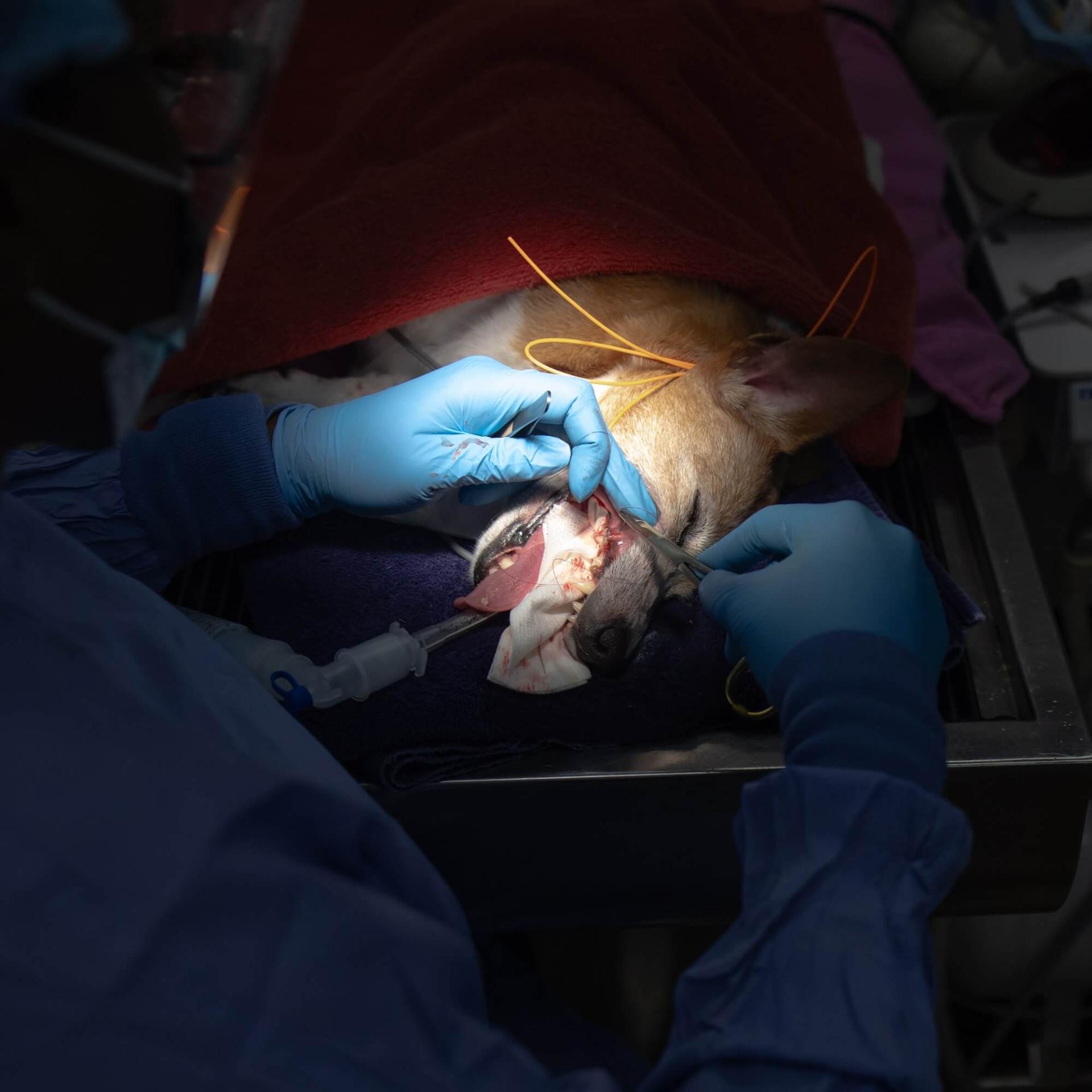Dentistry at Cabarrus Animal Hospital:
Our doctors and staff have completed extensive training in order to provide the latest treatment options and safest anesthesia protocols personalized to meet your individual pet’s needs. We enjoy educating clients on different teeth saving procedures and our ultimate goal is to eliminate chronic pain and infection to ensure all our patients are comfortable. Both routine and advanced procedures are available. Schedule your consultation today.
According to the American Veterinary Dental Society, more than 80% of dogs and 70% of cats have dental disease by the age of 3. Dental (or periodontal) disease is the most frequently diagnosed health problem in pets.
What are the signs of dental concerns for my dog or cat?
The first signs of dental concerns would be breath. If you smell bad breath, more than likely you may have a dental issue. Also, look at your dog's teeth. If you see plaque, tartar buildup, or even a loose tooth, that's an issue and it needs to be corrected immediately.
Common signs of dental disease include:
- Yellow or brown buildup (tartar) on the teeth
- Red, swollen, or bleeding gums
- Bad breath
- Excessive drooling
- Changes in eating or chewing habits
- Pawing at the face
- Loose teeth
- Depression
How can I, as an owner, help prevent dental disease in my animal home?
One of the simplest ways to prevent dental issues in your animal is to brush their teeth for 30 seconds to 1 minute daily. There are certain things you can also use, such as dental treats, dental food, and dental water additives.
Home Care
The most essential part of every dental plan involves setting up a home care plan. We are happy to show you how to brush your dog’s or cat’s teeth. However, we know this is not always possible and are here to provide other options to keep your pets teeth healthy. These options include treats, special diets, toys, and water additives to help keep the teeth clean. We are happy to discuss which plan will work the best for you and your pet.
At what age should I start worrying about my pet's dental care?
Worrying about your pet's dental care should start now. No matter what age they are, start dental care now because it helps with your dog's overall health.
Does my pet need to go under anesthesia for dental cleaning?
Yes, unfortunately, general anesthesia is needed for dental care when it comes to doing a dental prophy or extractions on your dog or cat. I see this question a lot because people are scared when dealing with senior animals and are hesitant to put their dog under anesthesia. We take serious precautions, such as doing blood work prior to the dental procedure. We also have monitoring devices on your animal and technicians present while the procedure is being performed. Anesthesia now is totally different from when I was a young vet.

Oral Surgery
We have completed extensive training to be able to perform advanced oral surgical procedures through general practice. We often perform procedures to remove oral tumors, repair fractures of the jaw, correct advanced periodontal disease, and treat cystic lesions within the bone.
Extractions
Unfortunately, sometimes removing teeth is the only treatment option in cases of periodontal disease, severe fractures, or painful inflammatory conditions. After the affected teeth are removed, the gingiva is closed to maximize healing. Bone graft can be used to save surrounding teeth by restoring an adequate amount of bone.
Restorations
Our pets can break their teeth by chewing on a toy or surface that is too hard. Sometimes the damage is too bad and the tooth either needs to be removed or referred for a root canal. However sometimes the tooth can be saved and a special substance can be applied to seal the tooth to eliminate pain and reduce the chance for infection. Cabarrus Animal Hospital, we have the skill set to perform this procedure.
Anesthetized Oral Exam and Cleaning
On the day of the procedure, a full anesthetized oral examination is performed. Each individual tooth is probed to check for periodontal pockets and a dental chart is recorded to keep track of potential problem areas. A treatment plan is then determined in the best interest of the patient. An ultrasonic scaler is used to clean all surfaces of every tooth, both above and below the gum line. Afterwards, each individual tooth is polished.
Dental Xrays
Our staff is highly trained in performing and interpreting dental radiography. Most dental disease occurs below the gumline and can only be found through dental xrays. This is why every one of our patients benefits from full mouth xrays at the time of their procedure to evaluate each individual tooth properly. Intraoral radiographs allow us to assess the internal structure of the tooth and root, the surrounding bone, check for missing teeth, fractured teeth, periodontal disease, tooth resorption, and facial trauma. We are happy to provide copies of the xrays and will explain any findings to you.
Oral Health Exam and Consultation
Your personalized treatment plan begins in the exam room. Our doctors will perform a thorough oral exam and perform bloodwork prior to all dental procedures to ensure our patients will be safe for anesthesia.
If you have questions, we would love to answer them for you. Please give us a call at the office at (463) 241-3528, or you can email us at [email protected]. Our staff would love to talk with you!

